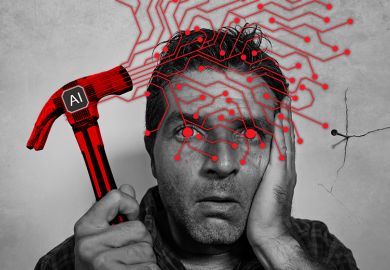The summer has seen universities under renewed criticism for high fees, high pay and for generally being highly out of touch with the real world. We have been here before, and although there are many ways to confront these arguments, I predict that sooner or later we will be here again.
I want to set out a particular case for where the value for higher education lies, which I hope will help stop us going round in circles. I want to start thinking in triangles.
Let’s consider, for example, the issue of how vocational learning fits into higher education. This has been the subject of unresolved debate for decades. Often the political discussion draws vocational and academic learning as two parallel lines and tries to devise ways to hop between them. But this results in tramlines stretching on ad infinitum. We never arrive anywhere.
There have been well-meaning and talented educationists who proposed replacing A levels with a mix of academic and vocational qualifications and wrapping them up into a single badge of attainment. This never received the right support, would always struggle to be greater than the sum of its parts – and, once again, the debate reached a dead end.
Not too long ago, I visited a school where a talk about apprenticeships used an illustration of a cobbler. Talk about stuck in the past!
And so the discussion keeps on revolving – vocational learning must reach the status of an academic education; but the status of an academic education depends on it not being vocational. Round and round in circles.
Instead, let’s consider a “learning triangle”. This is a way of looking at higher education as always including three elements: so-called traditional academic education; vocational education; and liberal education. Different courses will place different emphases on each of these three elements. But, importantly, in the centre of this triangle and underpinning all three is the joy of learning.
If we think of the triangle itself, although “academic” education and "vocational" education are at separate tips, they are both part of the same “shape of higher education”. This emphasises my view that a debate that casts vocational learning in universities as essentially distinct from academic learning is to chase a distinction that doesn’t exist.
To quote A. Anderson in A Race to the Top: “We should confront head-on the absurd notion that HE isn’t about skills or occupational competence.”
Perhaps contrary to general assumptions, vocational higher education is widespread in the higher education sector. Many universities have world-class reputations in the delivery of programmes that involve work-based learning and occupational competence. More than 60 per cent of existing higher education is vocational, and I personally struggle to think of any higher education learning experience that does not equip a student with skills that are useful in the workplace and the wider world.
Currently, the vocational offer from the UK’s universities includes many traditional areas, such as nursing, medicine, social work, journalism, accountancy, law and teacher training. My own university, Winchester, has for nearly 200 years been equipping students with the skills they need to become teaching professionals, working alongside hundreds of schools to enable trainee teachers to receive two-thirds of their higher education with an employer. We are now at the forefront of the development of degree apprenticeships.
Some universities are also developing innovative employer-based models and, in particular, moving from foundation degrees to embrace degree apprenticeships. One of the most eye-catching innovations, which boldly embeds the place of vocational learning in higher education, is the Dyson Institute of Technology.
This partnership between entrepreneur Sir James Dyson and the University of Warwick will be devoted to training engineers. As with other degree apprenticeships, students will earn a salary while studying and will not pay tuition fees. They will also work on real industry projects alongside mentors and research staff.
Some rough statistics from my university challenge an attempt to stereotype the “vocational” and the “academic” student as essentially different. At Winchester, about a fifth of our students join us with either vocational qualifications or a mix of A levels and vocational qualifications. Do these undergraduates tend to opt for vocationally focused degrees? No. Do they succeed as well as those with just A levels? Yes. In fact, many of our highest-achieving undergraduates, our scholars, come to us with Btechs.
With so much career-focused learning in higher education, it is important not to overlook the third tip of my learning triangle: a liberal education for all undergraduates. It is, I believe, a hallmark of university education and empowers students to explore complexity, diversity and change in society, culture, science and the natural world. It encourages students to develop inquiring minds with a constant drive to investigate values, ethics and civic engagement.
This aspect of higher education is not currently captured by assessment strategies such as the research excellence framework or the teaching excellence framework. What we need, according to my inspired colleague, Bill Lucas at the Centre for Real-World Learning, is the “JEF”, or the joy of learning excellence framework.
The joy of learning is what I believe the ancient Greek biographer and essayist, Plutarch, was referring to when he wrote: “The mind is not a vessel to be filled but a fire to be kindled.” It includes a deep love of and zest for learning, and a restless intellectual curiosity, innovation and creativity.
As a sector and as a society, we must keep on asking ourselves: how many fires are we igniting and stoking in the minds of our university students?
Joy Carter is vice-chancellor of the University of Winchester.
Register to continue
Why register?
- Registration is free and only takes a moment
- Once registered, you can read 3 articles a month
- Sign up for our newsletter
Subscribe
Or subscribe for unlimited access to:
- Unlimited access to news, views, insights & reviews
- Digital editions
- Digital access to THE’s university and college rankings analysis
Already registered or a current subscriber?







